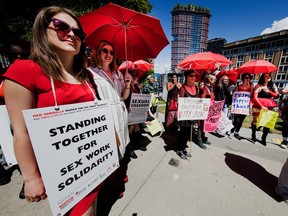We go to court because the current legislation makes the lives of those who carry out this work more dangerous.

.
This week, we will take the federal government to court. Hearings for the constitutional challenge to sex work laws began on October 3, and it is time for our courts and our society at large to finally change course.
Announcement 2
.
For decades, a war of ideologies has been waged on the backs of sex workers, leading to criminal laws that claim to protect these workers but instead make them victims. In 2013, the Supreme Court of Canada struck down sex work offenses in the first Bedford Decision, because they violate the rights of the Charter of sex workers. In response, the federal government approved the so-called Law for the Protection of Communities and Exploited Persons (PCEPA), which came into force in 2014 and makes the purchase of sex —and all communication related to it— illegal for the first time in Canada. Criminal law also prohibits public communication, material benefit, contracting and advertising of sexual services. And so, the damages that the Bedford court recognized as unconstitutional have been reproduced. Despite numerous efforts by sex workers to advocate for the repeal of these crimes, the federal government has failed to act.
.
Announcement 3
.
the Canadian Alliance for Sex Work Law Reform is an alliance of 25 sex worker rights groups across the country, led predominantly by sex workers. Along with six individual applicants, she is challenging Canada’s sex work-specific criminal offenses and seeking to strike them down because they violate the constitutional rights of sex workers to safety, health, security, autonomy, life, liberty, free expression, free association and equality.
These hearings are a time of reckoning: sex workers’ lived experience of the harms of criminalization must take precedence over political ideology and sex work-specific criminal laws must be struck down. There is much at stake.
Because all activities related to sex work are now criminalized, sex workers face the constant threat of criminalization, stigma, and discrimination. They are forced to isolate themselves, exposed to the risk of eviction and unable to access closed and secure workplaces. Sex workers are also prevented from meaningfully communicating with clients to access information related to their health, safety, and ability to refuse or consent to sex. They are also prevented from accessing health, social and legal services.
Announcement 4
.
And they are often subject to unwanted and unsolicited police presence in their lives. This is particularly true for Black, Indigenous, migrant, and transgender sex workers, as well as drug-using sex workers, who are regularly profiled and targeted.
The Ontario Superior Court of Justice will hear about all of these harms and more experienced as a direct result of the PCEPA. The evidentiary record provides a robust collection of years of research showing how sex workers have been isolated from supports, forced to endure poor working conditions and incidents of violence, and subjected to increased police presence and surveillance, while they are discouraged from seeking help from the law. execution for fear of being arrested and prosecuted. Sex workers and researchers have witnessed the colossal harms of PCEPA and are calling for the immediate repeal of bans on sex work.
ad 5
.
At the same time, the Crown and anti-sex work ideologues will make false claims that the sex workers who launched this challenge are somehow other than “vulnerable populations.” They will cite a false division between exploited survivors of the sex trade and freelance sex workers, as if they were separate categories: one experiencing abuse and no agency, and one agency and no abuse. But as the Canadian Alliance for Sex Work Law Reform has emphasized, sex workers’ experiences of exploitation and violence are due to the impacts of criminalization, which are most profoundly faced by the most marginalized sex workers living and working in Canada. difficult conditions.
ad 6
.
Even the Permanent Parliamentary Commission on Justice and Human Rights, in its June 2022 report entitled “Preventing Harm in the Sex Industry: A Review of the Exploited Individuals and Communities Protection Act,” it ultimately acknowledged that PCEPA “causes serious harm to those engaged in sex work by making the work more dangerous.” As the Supreme Court of Canada concluded in Bedford, a law that prevents sex workers from taking basic safety precautions is “a law that has lost sight of its purpose.” Eight years after its passage, there is no question that PCEPA is a failure and should be invalidated and nullified.
We hope the court finds the same.
Sandra Ka Hon Chu is the Co-Executive Director of the HIV Legal Network Y Jenn Clamen is the National Coordinator of the Canadian Alliance for Sex Work Law Reform.

